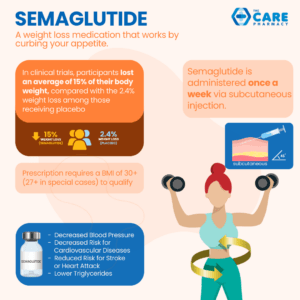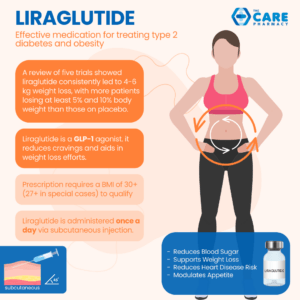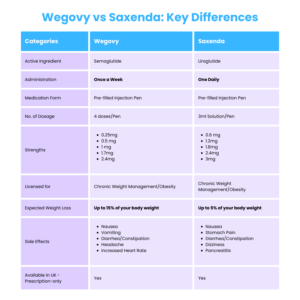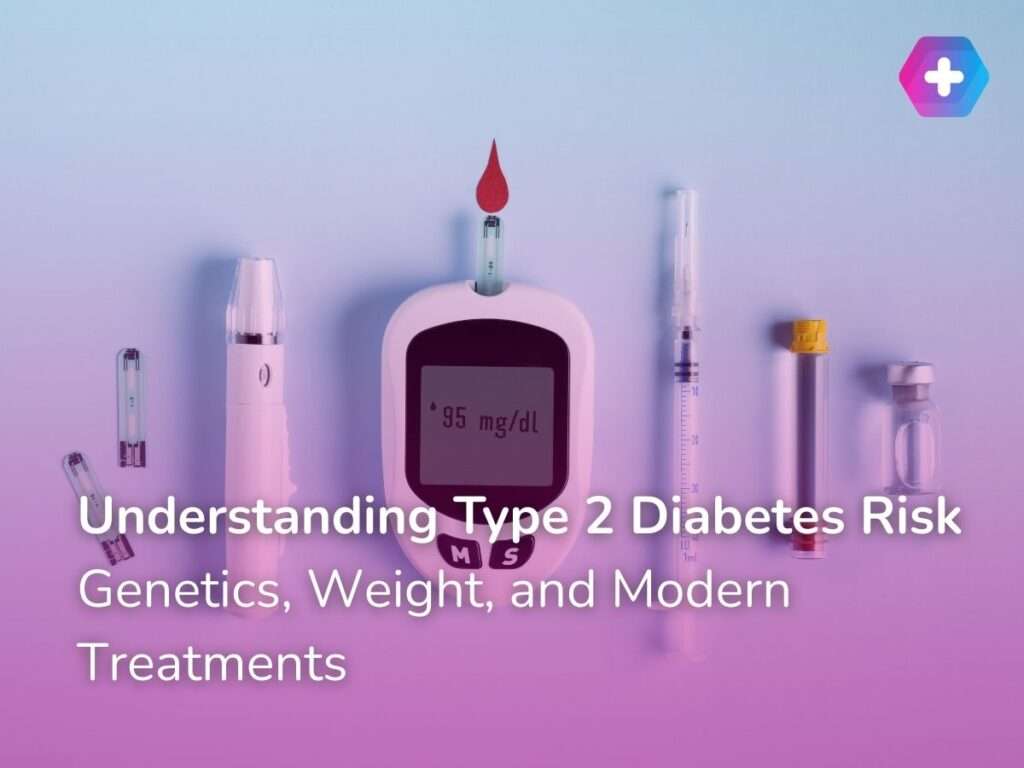In the pursuit of achieving and maintaining a healthy weight, you must have considered various methods, including dieting, exercise, and sometimes weight loss medications. Weight loss injections have gained popularity as an option for those struggling with obesity or needing to shed excess pounds to stay healthy. Two prominent options in weight loss injections are Wegovy and Saxenda.
Although Wegovy and Saxenda belong to the same family and behave similarly in the body, they contain different active ingredients. This comprehensive guide can tell you better about which weight loss medication you should choose.
What is Wegovy and Saxenda?
Wegovy and Saxenda are both prescription medications used to treat obesity in adults and adolescents aged above 12. Both GLP 1 medications are manufactured by Novo Nordisk, a pharmaceutical company that specialises in researching and developing treatments for chronic diseases such as diabetes, obesity and PCOS. .
Wegovy and Saxenda are meant for individuals with obesity, which is a Body Mass Index (BMI) of 30 or more, and for those who are overweight (BMI of 27 or more) with weight-related health issues like type 2 diabetes, high blood pressure, or high cholesterol. These weight loss treatments should be combined with a proper diet and exercise routine.
Am I Eligible?
How Do Wegovy & Saxenda Work for Weight Loss?
Saxenda and Wegovy are prescribed for weight loss, but they’re not quite the same. Saxenda contains an active ingredient called Liraglutide, while Wegovy has Semaglutide.
Both active ingredients work similarly, but the different ingredients mean they can be effective to different extents. Here’s how they work:
Appetite Reduction
GLP-1 is a hormone that is naturally produced in the body. It’s released in response to food intake and works by signalling the brain to create a feeling of fullness or satiety. The active ingredient in both weight loss injections mimics the effects of GLP-1, thereby helping to reduce appetite and calorie intake.
Delayed Gastric Emptying
In addition to reducing appetite, GLP-1 receptors slow gastric emptying, meaning the stomach releases its contents into the small intestine more slowly. This prolongs the feeling of fullness and can lead to a reduction in overall food intake.
Blood Sugar Control
Semaglutide in Wegovy also helps regulate blood sugar levels by increasing insulin secretion when blood sugar levels are high and decreasing glucagon production when blood sugar levels are low. This is particularly beneficial for individuals with type 2 diabetes or prediabetes.
Wegovy vs Saxenda: Usage & Dosages
Wegovy and Saxenda are both weight loss injections. However, there are key differences in their usage and dosages, allowing you to decide which is more suitable for your weight management goals
How to Use Wegovy?
Wegovy is given as an injection under your skin once a week.
At first, you’ll start with a dose of Wegovy 0.25 mg once a week for four weeks. Then, after those first four weeks, the dose goes up to Wegovy 0.5 mg once a week.
After another four weeks, the dose is increased again to Wegovy 1 mg once a week. This gradual increase in Wegovy dose helps reduce the chance of side effects and lets your body get used to the medicine slowly.

What is the maintenance dose of Wegovy?
The maintenance dosages of Wegovy are:
- Wegovy 1.7 mg
- Wegovy 2.4 mg
How to Use Saxenda?
Saxenda is administered once a day. You can use it by giving yourself its jab under your skin in your abdomen, thigh, or upper arm. You can change where you inject it and the time you do it without needing to change the amount you take. But remember, you should never inject Saxenda into a vein or a muscle.

What is the recommended dose for Saxenda?
The recommended dosage for Saxenda varies. In the beginning, you usually start with a smaller dose of 0.6 milligrams every day for the first week.
After that first week, the amount you take goes up slowly until you reach a dose of 3 milligrams each day. This gradual increase in the dose is meant to make it easier on your body and reduce any side effects while you get used to the medicine.
Comparing Wegovy and Saxenda: Which Weight Loss Injection is Better?
When deciding between Wegovy and Saxenda, several factors come into play. Your healthcare provider will consider your individual medical history, weight loss goals, and other health conditions before prescribing either of these medications. Here’s a comparison to help you make an informed choice.

A study lasting 68 weeks compared the effectiveness of Saxenda and Wegovy in 300 adults. The research discovered that people who used Wegovy experienced greater weight loss compared to those who used Saxenda.
People who used Wegovy lost 16% of their starting weight when they ate better and exercised more. On the other hand, those who took Saxenda only lost 6% of their starting weight.
Final Verdict
When we compare Wegovy and Saxenda, both have proven to be helpful in making people lose weight. However, the research suggests that Wegovy tends to be more effective.
It’s essential to remember that neither of these medicines is a magic solution for losing weight. All the scientific studies have demonstrated that you can achieve better results in weight loss and have a healthier heart by following a low-calorie diet and staying active regularly.
Is Wegovy Available in the UK?
Wegovy (Semaglutide) was launched in the UK in September, 2023 and now available in various online pharmacies such as The Care Pharmacy in Bradford & Leeds. Book an online consultation at our weight management clinic, where our dedicated team of healthcare experts will carefully assess your current health status. Following this assessment, you’ll be able to get a prescription for Wegovy as part of your tailored treatment plan to treat obesity.
FAQs
- Wegovy vs Saxenda: What works best for weight loss?
Clinical trials have shown that Semaglutide reduced insulin levels by 27.8% compared to 15.4% with liraglutide.
- Can I switch from Saxenda to Wegovy?
If you’re thinking about changing from Saxenda to Wegovy, the first step is to talk to your healthcare provider. After that, you can begin your Saxenda injections one week after your last Wegovy injection.
- How much weight can I lose with Wegovy in a month?
Patients on semaglutide lose an average of around 5% of body weight after one month and 8% after two months.
- Where can I find Wegovy in stock?
If you already have a prescription for Wegovy you can easily buy it from UK registered online pharmacy in Bradford and the medication will be delivered at your door step free of cost.
- How can I get a prescription for Wegovy?
You can book an online consultation at our weight management clinic, where our team of healthcare professionals will assess your health condition. Following the evaluation, you can receive a prescription for Wegovy to address your obesity.
Medically reviewed by
Mohammed Lakhi
Superintendent Pharmacist














